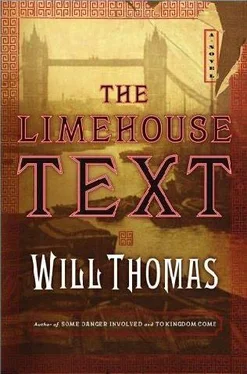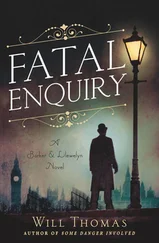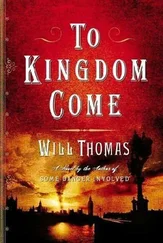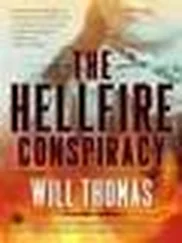Will Thomas - The Limehouse Text
Здесь есть возможность читать онлайн «Will Thomas - The Limehouse Text» весь текст электронной книги совершенно бесплатно (целиком полную версию без сокращений). В некоторых случаях можно слушать аудио, скачать через торрент в формате fb2 и присутствует краткое содержание. Жанр: Исторический детектив, на английском языке. Описание произведения, (предисловие) а так же отзывы посетителей доступны на портале библиотеки ЛибКат.
- Название:The Limehouse Text
- Автор:
- Жанр:
- Год:неизвестен
- ISBN:нет данных
- Рейтинг книги:5 / 5. Голосов: 1
-
Избранное:Добавить в избранное
- Отзывы:
-
Ваша оценка:
- 100
- 1
- 2
- 3
- 4
- 5
The Limehouse Text: краткое содержание, описание и аннотация
Предлагаем к чтению аннотацию, описание, краткое содержание или предисловие (зависит от того, что написал сам автор книги «The Limehouse Text»). Если вы не нашли необходимую информацию о книге — напишите в комментариях, мы постараемся отыскать её.
The Limehouse Text — читать онлайн бесплатно полную книгу (весь текст) целиком
Ниже представлен текст книги, разбитый по страницам. Система сохранения места последней прочитанной страницы, позволяет с удобством читать онлайн бесплатно книгу «The Limehouse Text», без необходимости каждый раз заново искать на чём Вы остановились. Поставьте закладку, и сможете в любой момент перейти на страницу, на которой закончили чтение.
Интервал:
Закладка:
“No one came in,” Ho stated. Seated on the bottom step, his arms folded across his thick stomach, he looked like a dyspeptic Buddha.
“Blast. Why was Nevil here?” he asked, addressing us. “Were you helping him with a case?”
“He was getting back to me with the results of an investigation regarding my late assistant’s death last year.”
Poole looked at him shrewdly. “Ah, yes, that’s right. Your man was shot between the eyes like Nevil, wasn’t he? You think it’s the same man?”
Barker shrugged.
“Had you come across new evidence?”
“He merely came to inform me that the case was closed. Apparently, we were wrong.”
Poole shook his head and toyed with the hanging ends of his long side-whiskers in frustration. Finally, he sighed.
“You’ll be at home or at your chambers?” he asked.
“Yes,” Barker answered. “I am setting aside all our other cases temporarily. I believe we can go forward with the supposition that the same man killed both my late assistant, Quong, and Inspector Bainbridge.”
“Limehouse,” Poole muttered. “It would have to happen in Limehouse. By gor, I hate the place. I don’t know what Nevil saw in it, I really don’t. You ask for directions or the time of day here and everyone suddenly forgets English and shuts up like an oyster. There is going to be a lot of pressure from upstairs to solve this one quickly. Nevil was a bit unorthodox, but he was an inspector, after all, and Commissioner Henderson does not take kindly to the death of a constable, let alone an inspector. If I do not clear this up quickly, he might put me in charge here permanently, blast the fellow.”
Barker’s stony face showed no expression at the outburst.
“You there,” Poole said, indicating the first constable. “Go fetch a cart to transport the body to K Division.” He turned to another. “You take a lantern and walk along the tunnel and look for clues.” He pointed to a third. “And you come with me and take notes. Shall we go into Mr. Ho’s restaurant, then, and talk, gentlemen?”
Poole questioned us, requestioned us, and then separated us and cross-questioned us. He asked the same questions in so many different ways, I began to get mixed up in the minor details. When he finally let us go two hours later, I’d told him everything. Everything, that is, that my employer wished me to say, for I noted that the one thing Cyrus Barker had been very careful to omit was the existence of the book we had just discovered, the cause of our present misery and of a good deal more to come.
3
When we arrived at Barker’s home in Newington, he shot up the stairs while I was still removing my coat. I was certain the little package had been burning a hole in his breast pocket the entire day. I went outside to the bathhouse for a good soak, and afterward I ate a solitary dinner. Apparently, Barker was too caught up puzzling over his new treasure to even inform his butler he was not coming down. I ate my terrine des lapins while our butler, Jacob Maccabee, hovered about, venting sighs like a bellows. By the time I had reached coffee and cheese, he could stand no more and marched upstairs to speak with his master. A few minutes later, Mac was coming down again, shaking his head and muttering to himself in Yiddish.
Later that night I was stretching out in bed when my feet came in contact with Barker’s Pekingese, Harm, who nipped my toe to inform me he was there. He had a habit of curling up right where I wanted to put my feet or getting tangled up in my limbs, and once or twice he’d even tried to sleep on top of me. I set him right this time and moved him to the side, despite his growling protests. Then I stretched out, all five foot four inches of me, and lay there, listening to the night sounds from the window Barker had permanently screwed open a crack. Another sound came to my ears, enough to make me open my eyes and listen closer.
It was a thrumming sound and it made the house vibrate slightly. It was like the sound a heavy branch makes when a child swings on it from a rope. I knew instantly it must be the heavy bag hanging in the basement. Perhaps my employer was trying out some moves from his little manual. I turned up the gas lamp over my head and consulted my bedside clock, noting that it was almost three-thirty. I admired the man, but sometimes he can be a trifle eccentric. I considered joining him for a moment but instead rolled over and went back to sleep.
Barker was not his usual self at breakfast. I do not believe he had slept at all. He came down with his silk dressing gown tied loosely over his nightshirt and a pair of carpet slippers on his feet. His hair hung down in spikes over his smoky spectacles as if he had worked himself into a lather on the heavy bag.
“I’m not going to the office just now, lad,” he muttered. “I’ll be along in an hour or so.”
“Yes, sir,” I answered. For once, I was the more nattily dressed of the two of us. I wore one of my best suits, a dark cutaway coat and trousers, a gray waistcoat, and a striped tie. I’d polished my boots and beaten back my hair and was now ready to present myself to the world. I bade my adieus, put on my coat and hat, and hailed a cab outside.
It was a novel experience being alone in the cab. Both working and living with my employer, I was at his beck and call through the week, with a half day off on Saturday. I attended worship services with him at the Baptist Metropolitan Tabernacle on Sundays, and at any time, Barker might wish to discuss some part of the case we were working on or to give me instructions for the next day, and there went another hour. I was supposed to go to the office, but just then the thought occurred to me that I might use the time to investigate the building Barker owned. I tapped the trap of the cab overhead with my stick.
“Take me to the docks. Limehouse.”
“Dunno ’bout that, sir,” the driver said through the heavy scarf he wore over his mouth. Cabmen were reluctant to go to that part of London. They often couldn’t get a return fare, their wheels got dirty in the ill-swept streets, and the children of the East End were experts at shying rocks.
“I’ll double your fare, driver. I’m looking for a place called Three Colt Street.”
In ten minutes we were crossing London Bridge, and I was revisiting the scene of our first case in Aldgate. I couldn’t resist a shudder when we passed the Minories and I saw the stable where I had very nearly ended my life. But all things must pass, as my father often said, and here I was, hail of limb, investigating another case. The building had been let to a blacksmith who had assembled a forge in the old trackside building.
I passed through districts and slivers of districts: Spital-fields, Whitechapel, Wapping, Bethnel Green. It was not until we were almost there that the cabman hazarded another remark.
“What was that?” I asked.
“I said, ‘Looks like we ain’t the only ones a’goin’ dockside.’ ”
I leaned forward, looking over the leather doors and the head of the cab horse. A dark brougham was ahead of us, wending its way down Commercial Road. The vehicle looked vaguely familiar. Then I realized why. It was the one owned by Harm’s keeper, a heavily veiled woman who came twice a week to bathe and brush him. The dog had been injured during our first case and she had picked him up in that very brougham. She was another of Barker’s interminable secrets. Who was she? Why the veil? I thought it possible that she might be the widow that my employer occasionally kept company with. The appearance here of our two vehicles together was too much for coincidence.
“I say, follow that brougham!”
Barker’s late assistant had lived at 127 Three Colt Street, and now the veiled woman was going there as well. I could add two and two, and another two, come to think of it. I was in charge of the accounts in our office, and there was a regular amount paid monthly to a Miss Winter at the Bank of England in Threadneedle Street. Were I a betting man, I would say the veiled woman and Miss Winter were one and the same.
Читать дальшеИнтервал:
Закладка:
Похожие книги на «The Limehouse Text»
Представляем Вашему вниманию похожие книги на «The Limehouse Text» списком для выбора. Мы отобрали схожую по названию и смыслу литературу в надежде предоставить читателям больше вариантов отыскать новые, интересные, ещё непрочитанные произведения.
Обсуждение, отзывы о книге «The Limehouse Text» и просто собственные мнения читателей. Оставьте ваши комментарии, напишите, что Вы думаете о произведении, его смысле или главных героях. Укажите что конкретно понравилось, а что нет, и почему Вы так считаете.












